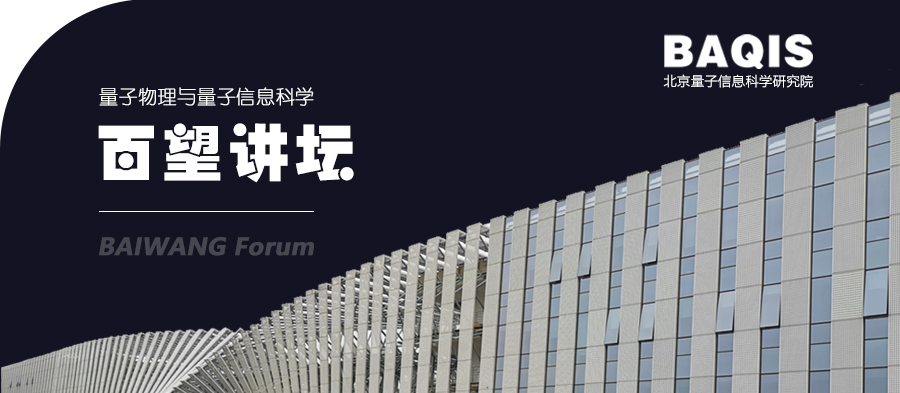Baiwang Forum 37: QUBITS BASED ON LIQUID LIGHT: A POLARITON PLATFORM FOR QUANTUM COMPUTATION
2022/11/10

Date and Time: 10-Nov-2022 15:00
Speaker: Prof. Alexey KAVOKIN International Center for Polaritonics, Westlake university
Host: Qihua Xiong (Tsinghua University,BAQIS)
Title: QUBITS BASED ON LIQUID LIGHT: A POLARITON PLATFORM FOR QUANTUM COMPUTATION
Abstract:
Alexey KAVOKIN, the director of?International Center for Polaritonics. He received his master degree in physics with honor from St-Petersburg State Technical University and Ph.D in Physical and Mathematical Sciences at A.F. Ioffe Institute, Russian Academy of Sciences in St Petersburg. Afeter a one-year postdoctoral research period at Università degli Studi di Roma II "Tor Vergata", Italie Dipartimento di Ingegneria Elettronica, he was nominated as the chairholder, Marie Curie Chair of Excellence “Polariton devices”. From 1998 to 2005, he was the university Professor at Université "Blaise Pascal" Clermont-Ferrand II in France. From 2005, he was the chair of Nanoscience and Photonics and professor of Physics and Astronomy School in University of Southampton. Prof. Kavokin accepted the offer as the director of the International Center of Polaritonics and chair professor in Westlake University In June 2018. Prof. Kavokin’s field of expertise is physics of light-matter coupling and solid state physics, both theoretical and experimental. Research activity and contributions are in many-body quantum physics of excitons and exciton-polaritons. In 1992, he joined the field of Polaritonics and published his first paper on the theory of exciton-polaritons in quantum well, wire and dot structures. In 1993, Prof. Kavokin collaborated with the optical spectroscopy groups of the Universities of Wurzburg and Montpellier on the exciton-related phenomena in diluted magnetic semiconductors. In 1998, he predicted the vertical motional narrowing effect for exciton-polaritons in multiple quantum wells with Lucio Andreani (Pavia).
About the Speaker:
Superconducting flux qubits are based on a superposition of clock-wise and anti-clockwise currents formed by millions of Cooper pairs. In order to excite the system in a superposition state, the half-quantum flux of magnetic field is passed through the superconducting circuit containing one or several Josephson junctions. The system is forced to generate a circular current to either reduce the magnetic flux to zero or to build it up to a full-quantum flux. We argue that a valuable alternative to superconducting flux qubits may be offered by qubits based on superfluid currents of quasiparticles of liquid light: exciton-polaritons, propagating in plane of semiconductor microcavities [1]. Circular currents of exciton-polaritons mimic the superconducting flux qubits being composed by a large number of bosonic quasiparticles that compose a single quantum state of a many-body condensate. The essential difference comes from the fact that polaritons are electrically neutral, and the magnetic field would not have a significant effect on a polariton current. We note however, that the phase of a polariton condensate must change by an integer number of 2π, when going around the ring. If one introduces a π-phase delay line in the ring, the system is obliged to propagate a clockwise or anticlockwise circular current to reduce the total phase gained over one round-trip to zero or to build it up to 2π. We show that such a π-delay line can be provided by a dark-soliton embedded into a ring condensate and pinned to a potential well created by the C-shape non-resonant pumpspot. The physics of resulting split-ring polariton condensates is essentially similar to the physics of flux qubits. In particular, they exhibit pronounced Bloch oscillations passing periodically through clockwise and anticlockwise current states. We argue that qubits based on split-ring polariton condensates may be characterized by a very high figure of merit due to the topological protection of superfluid circular currents. Moreover, as the Bose-Einstein condensation and superfluidity of exciton-polaritons were observed at the room temperature [2], quantum networks based on polariton qubits would not require cryogenic operation temperatures. This makes them a valuable alternative to superconducting qubits [3].
1. A.Kavokin, J.J. Baumberg, G. Malpuech and F.P. Laussy, Micorcavities, Oxford Science Publications, Oxford, 2017, ISBN: 9780198782995 2. "Room-Temperature Spin Polariton Diode Laser", Bhattacharya A, Baten MZ, Iorsh I, Frost T, Kavokin A, Bhattacharya P, Phys. Rev. Lett. 119, 6, 67701 (2017)
3. “Split-ring polariton condensates as macroscopic two-level quantum systems”, Y. Xue, I. Chestnov, E. Sedov, X. Ma, S. Schumacher, A. Fedorov and A. Kavokin, Physical Review Research, 2021, in press
 中文
中文 Email
Email QCloud
QCloud Log in
Log in
